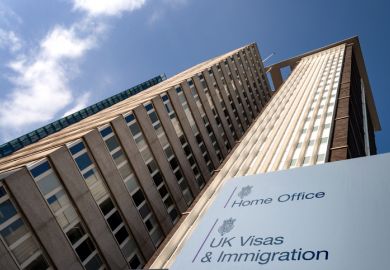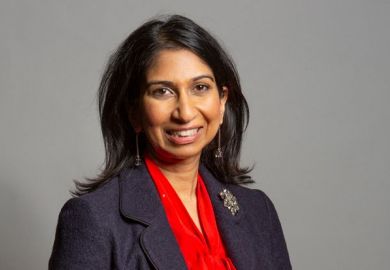It is “hard to imagine” a policy more likely to torpedo the Westminster government’s higher education policy goals than a “mindless crackdown” on international student enrolment, former universities minister Lord Johnson of Marylebone has warned.
After student migration to the UK hit record levels – albeit on the back of pent-up demand that built up during the Covid pandemic – The Times reported that prime minister Rishi Sunak was considering allowing only “elite” universities to recruit overseas learners.
Lord Johnson told Times Higher Education that other countries “look with envy at the UK’s appeal to global talent” and that it would be reckless to squander this.
“Higher education is one of our few globally competitive sectors and demand for places reflects its high standing in countries that are central to our post-Brexit positioning, including India,” he said.
“It’s hard to imagine a policy more likely to harm UK ambitions to become a science superpower and to level up across the country than a mindless crackdown on international students.”
One option would be for the government to tie the issuing of student visas to the new standards regime being operated by the Office for Students, which sets thresholds for graduate employment, as well as student retention and completion. Similar plans were floated in 2016, when Theresa May was prime minister, but were never implemented.
But critics countered that if there were poorer quality courses in UK universities, the focus should be on improving them, not on restricting access.
“The idea that some courses are so bad we should block revenue-generating foreign students from them, while still being happy for the taxpayer to fund UK students to attend them in unlimited numbers, simply doesn’t make sense,” Iain Mansfield, head of education and science at the Policy Exchange thinktank, and a former adviser to Conservative ministers, said on Twitter.
Anand Menon, professor of European politics and foreign affairs at King's College London, said that universities were “a massive successful export for our country” and also “incredibly useful in drawing in investment and talent in areas that otherwise might struggle to do so”.
Restricting international recruitment would likely hurt universities outside south-east England that the government wants to drive the levelling-up agenda, he argued.
“The idea that this is a rational economic policy strikes me as for the birds,” Professor Menon said.
Sir David Bell, vice-chancellor of the University of Sunderland, said the policy ideas were “ludicrous”.
“If it happened, it would demonstrate beyond doubt that the government only cared about so-called ‘elite’ institutions, held students studying in other universities in utter contempt, and had ditched any pretence at levelling up,” he said.
“We should not be afraid at calling out crackpot polices that will deeply damage the UK internationally, never mind the impact it will have in every part of our country.”
Neal Juster, vice-chancellor of the University of Lincoln, said that restricting international student numbers would “stall much-needed growth” across the UK.
“Despite claims to the contrary, many universities have little discretionary cash and significant pay rises are unaffordable without cost-cutting by some means. Removing international student numbers would exacerbate this issue; fewer students will require fewer staff to teach them,” Professor Juster said.
“Even if the mooted policy is not enacted, international students have many alternatives; sending any signal that they are not welcome in the UK is very likely to reduce application numbers this year.”
One particular concern has been the rapid rise in the number of dependents coming to the UK with students, a shift that is tied to the move from China to countries such as India and Nigeria for recruitment.
The Times suggested that Suella Braverman, the home secretary, was considering capping the number of family members that could be tied to a student visa and requiring students to show they had enough money to look after relatives.
Vivienne Stern, chief executive of Universities UK, said that international students brought “enormous benefits to university campuses”.
“The financial contribution they make has been essential, given the long-term decline in funding for teaching UK undergraduate students and balancing the books on research,” she said.
“Limiting international students would be an act of economic self-harm that would damage many parts of the country the government aims to make more prosperous.”
Register to continue
Why register?
- Registration is free and only takes a moment
- Once registered, you can read 3 articles a month
- Sign up for our newsletter
Subscribe
Or subscribe for unlimited access to:
- Unlimited access to news, views, insights & reviews
- Digital editions
- Digital access to THE’s university and college rankings analysis
Already registered or a current subscriber? Login








